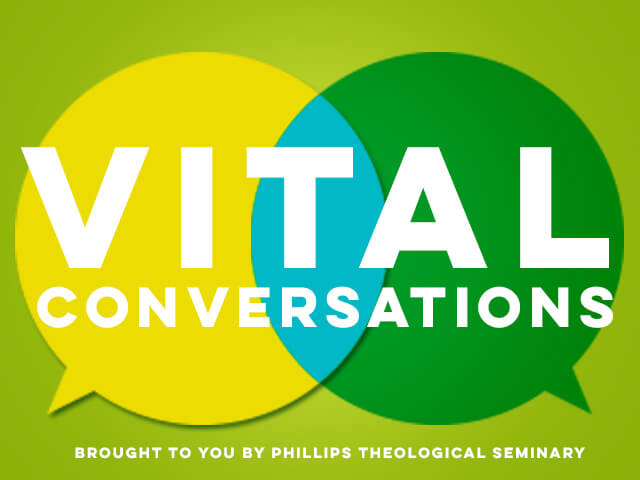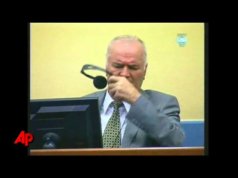
(Editor’s Note: Vital Conversations is a running series of commentaries from various faith leaders. The series is sponsored by Phillips Theological Seminary, though contributions come from theologians who are unassociated with the seminary.)
“Look, O Lord, and see, for I am despised. Is it nothing to you, all you who pass by? Look and see if there is any sorrow like my sorrow, which has brought upon me, which the Lord inflicted on the day of his fierce anger.”
— Lamentations 1:11–12
In her book Lyrics of Lament, Prof. Nancy Lee tells a story of a man she knew in Bosnia in 1996 soon after the war there had ended. Everyone around had been devastated by the war, and they were all suffering with the trauma of the hardships and the horrors. This young man had served in the army, and he struggled with how to process the violence he had seen and experienced. Therapy was considered taboo.
The man’s idea was that he could turn to his church and pastor to find healing and share his songs. Since he was a gifted musician, he asked if he might give voice and expression to his hurt and grief, and thus draw others to the church for life and grace. He wanted to sing laments.
The pastor quickly dismissed him. He was told that the church emphasized positivity and praised worship and joy. There was no place in worship for sadness.
Lee writes,
At this rebuke, the young man fell into an unresolved despair laid on top of his inner, unprocessed trauma and suffering, and he painfully realized his church’s music was largely irrelevant for helping others who were as psychologically wounded as he was.
I’ve heard many similar sentiments from pastors and parishioners. Pastors don’t want to allow sad songs into their services because people will start to notice and then complain that the music is too difficult, too melancholy. It doesn’t take many sad songs to begin to get that critique. “Focus on positivity” is the word of the day. I doubt most churches sing any sad songs at all. Doubt and despair seem unwelcome. Everyone needs to be resolute, chipper, happy-clappy.
But we need to allow for doubt and despair. Those sentiments don’t need to win the day, but they do need to be given space in church, in worship, in and with God’s people. For they are there. This young man perhaps is right, and I so want him to be wrong — the church’s music is largely irrelevant for people who are hurting.
We have to do better.
Lament has its place
It’s been said that songs that are universal break into the categories of lullabies, wedding songs and laments. Laments may have been jettisoned to some degree, but they still function in a powerful way in our society. We need grief songs. We need a way to express our sorrow. We need a liturgy of lament.
Sting wrote a song, I Hung My Head (which Johnny Cash covered years later), about a boy or man who was sighting his gun. He drew a bead on a man on a horse in the distance, and then he pulled the trigger and shot the man. He orphaned the man’s kids. He widowed the man’s wife. Now he was going to die. All for one moment.
In A Long Ride Home, Patty Griffin sings a song about regretting words you wished you’d never said. After the death of his wife, a man goes home to the house he’d lived in with his wife for 40 years. He lays in the bed and misses her. He’d like to take back so much of what happened.
We can laugh at some regrets. Not all of them are life or death. Many seem to involve tattoos. You will regret your NO REGERTS tattoo instantaneously. Hopefully, you’ll appreciate the irony soon thereafter.
Ron Burgandy immediately regretted jumping into the bear pit to save Veronica.
The storm troopers went home after a long day of work and regretted letting C3P0 and R2-D2 go. Those were the droids they were looking for.
Cam Newton didn’t talk to the press much after Super Bowl 50. No big deal, though he may get pounded on that decision for a long, long time.
A litany of regrets
But Lamentations, as a book, isn’t light-hearted. Instead of laughing at a bad choice or poor decision, we read, “For these things I weep; my eyes flow with tears; for a comforter is far from me, one to revive my spirit; my children are desolate, for the enemy has prevailed.” (1:16)
She says there is no one to comfort her. Jerusalem has become filthy. The young men and women have been led into captivity. Lovers have deceived her. Priests and elders perished. There is groaning, filth, slavery and sin.
I’m especially captured by 1:20, which says, “Look, O Lord, for I am in distress; my stomach churns; my heart is wrung with me, because I have been very rebellious. In the street the sword bereaves; in the house it is like death.” (1:20)
I know I’ve felt this way many times. I’m about to be found out. My heart races. My stomach churns. My mind won’t stop. It’s such a terrible feeling. My secret has been discovered.
I wish I hadn’t:
- Sent that text.
- Repeated that joke.
- Gone on that trip.
- Broken up with him/her or stayed with him/her.
- Made that stand or not stood up when it was time to.
- Kept my mouth shut or opened my big mouth.
- Lied. Cheated. Stolen. Ran.
- Downloaded that app.
- Spent that money.
- Made that investment.
- Believed that person.
Another stream of regret involves things we didn’t do. We regret:
- Not taking more time.
- Not forgiving.
- Not applying.
- Not asking.
- Not trying.
- Not creating.
- Not risking.
- Not listening.
- Not putting down the computer.
- Not taking the time.
- Not sharing our story.
- Not inviting someone.
- Not seeing, listening, caring or helping.
Lamentations is in the Bible for all of us
Laments help us as we share our sorrow. They help us to listen to others without fixing everything. They help give us a voice in big and small things. We can regret micro moments. We can regret words said and unsaid. We can regret how moments pile up into lives. We can regret wars, destruction, idolatry, a lack of compassion. We can enter into the reality that this world is not as it is supposed to be or should be.
We lament in our journey together on this earth. We’re sojourners on this path together. We all have our griefs and regrets, or else, we will. We need a place to share those. We grieve racism, divorces, deaths, debts, loss of jobs, miscarriages, children and parents and siblings and friends not walking with the Lord, sicknesses, heartaches, unfulfilled dreams, injustices, suicides, pornography, rape, hunger, abuse, failures, incompetencies, dashed hopes — and more. We grieve sin. We regret our part, however active or passive.
Or do we stuff those off and pretend either that we don’t have regrets or that the church cannot allow them?
In Lamentations 1:11-12, Lady Jerusalem asks if anyone might see her or if they’ll all pass by. Jesus tells the story of the Good Samaritan in Luke 10, and, in doing so, he’s claiming the role of the good neighbor for himself. He hears the cries. He sees the hurt. Instead of passing by, he stops to help. He gets dirty and bloody. He pays the cost himself to seek and save, to rescue the man in affliction, desolation, hurt and grief.
We should do likewise
Let’s see and hear and stop and help. Let’s not be in such a rush. Let’s honor grieving, hurting people.
In the last day when all things are set right by Jesus, we will see how it all turns out. You will get to see all of your hurts fixed by God. All the words and actions will turn around into happiness and blessing. That includes all the hurt done to you, and all the hurt you have done to others. Your regrets will be redeemed. So will your life. So will the world and all things.
Jesus will do this. This may seem like a long way off. It may not seem like it’s very important or practical for today, not when you’re still in the same situation as when you cried out. Lamentations in 585 BC was not that different than in 587 BC.
It’s not going to wipe it all way. The hurt and death and sin will still be there.
But a new day is coming. God hears your cry. He always has and he still does. He promises he will make it right, so we trust him. He promises he will hear, so we trust him. He promises he will both judge and forgive, so we trust him. He promises he will come back, so we trust him.

Previous installments of Vital Conversations
‘Broken, hate-filled people’ ruin Jesus’ ‘Good News’
Banning refugees would deny Christianity’s vulnerability
In Trump, Republican Party gets the savior it has sought
With Jesus born, Mary would have been uninsured in OK
Faith community dialogue: Criminal justice reform
Save persecution label for when liberty is endangered
Science, religion agree: ‘We are part of nature’
Ten Commandments: Reactions spur moral discussion
Vital Conversations: Christianity needs a Jon Stewart
Imam: A Muslim is your brother from another mother
Pope’s visit should ‘enrich our impoverished discourse’
















